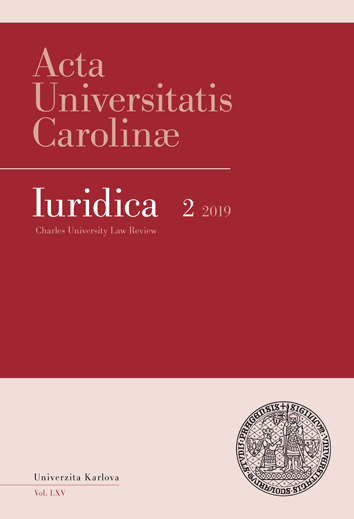Výklad právních jednání a interpretace soukromoprávních předpisů: co mají společného, čím se liší a jaký to má význam?
The Interpretation of Legal Acts and the Interpretation of Private Law: What are Their Common Features, What Makes Them Different and What Significance Does It Have?
Author(s): Karel BeranSubject(s): Law, Constitution, Jurisprudence
Published by: Univerzita Karlova v Praze, Nakladatelství Karolinum
Keywords: interpretation; methods of interpretation; private law; legal act (legal conduct); teleological interpretation; intent of the person taking an act; interpretation of a contract
Summary/Abstract: This paper aims to clarify what is the difference between the interpretation of legal acts (conduct) and the interpretation of provisions of private law legislation, and what is of the importance thereof in terms of unity and fragmentation of law as a system. First of all, the paper explains that comparing the interpretation of legal provisions with the interpretation of legal act is possible and it is not conceptually two completely different cases, even though we find different ways of interpretation in connection with what is being interpreted. The author concludes that, in the two above-mentioned cases, the use of interpretation methods results in completely different manners of interpretation. If linguistic, systematic and logical method of interpretation serves correctly as the starting point in the construction of law and these methods are followed by teleological interpretation, in the case of legal acts, the order is exactly the opposite. The basic method of interpreting legal acts is teleological, while systematic and logical interpretation can only serve to establish the intent followed by the person taking the act. The practical consequence of differentiating the methodology of interpretation is the view of law as a system that consists not only from general legal rules, but also from legal acts between individuals. However, although a legal act is formally described or understood as individual, it is necessary to differentiate legal act between two individuals and legal act affecting individually unspecified natural or juristic persons, as in the case of founding legal act, i.e. instrument of constitution of a juristic person. Such legal act must be understood substantivelly and not formally. Otherwise, it could result not in a systemic approach to law, but in its fragmentation, or antisystemic interpretation lacking rational justification.
Journal: Acta Universitatis Carolinae Iuridica
- Issue Year: 65/2019
- Issue No: 2
- Page Range: 117-131
- Page Count: 15
- Language: Czech

